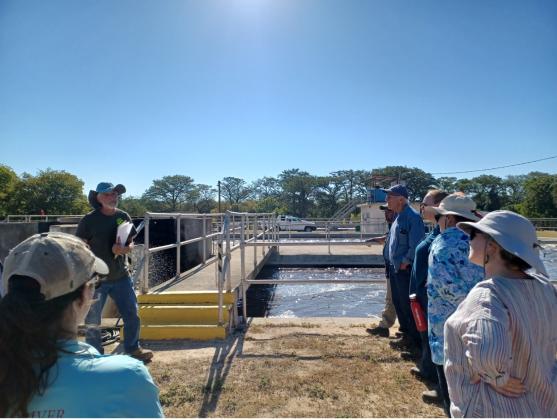Advocates examined ongoing water challenges, opportunities
Over 40 water advocates from across the region gathered in Bandera last month to learn, connect and strategize about area water stewardship. “The work to protect our aquifers and rivers is challenging but vital to the long-term prosperity of the Hill Country. It makes all the difference to be able to work together, learn from one another, and celebrate each other’s successes,” said Hill Country Alliance (HCA) Water Program Manager Marisa Bruno. More than 40 people, representing 27 different local organizations from 13 different Hill Country counties including Bandera, Blanco, Bexar, Comal, Kendall, Kerr, Kimble, Gillespie, Hays, Medina, Real, Travis, and Uvalde attended the grassroots gathering organized by HCA.
The day began with a tour of Bandera’s wastewater treatment plant. Bandera Mayor Pro Tem Rebeca Gibson welcomed the group to the facility and explained the need to move and update the plant. “This plant has flooded several times over the years, sending untreated wastewater down the Medina River. Future state and local investments into our system should be aimed at moving our plant out of the river’s floodplain, while also transitioning to a reuse system that puts treated wastewater to use through drip irrigation on sports fields and hay farms, for example.”
The gathering continued on to Bandera Brewery for an afternoon of speakers and discussion. Dave Mauk, General Manager of the Bandera County River Authority and Groundwater District kicked off the program with a conversation about drought.
“The U.S. Drought Monitor might show that drought conditions have improved– but we’re still feeling the drought in Bandera,” explained Mauk. “Aquifer levels in the Lower and Middle Trinity have not recovered, and the Medina River is still dry.”
Representatives from Save Medina Lake added the lake is at seven percent capacity.
In a conversation about ways to mitigate the impacts of drought, participants highlighted the importance of educating community members and adopting technology like smart meters to encourage more water conservation.
Nick Dornak, Director of Watershed Services at The Meadows Center for Water and the Environment at Texas State University, and Robin Gary, Managing Director of The Watershed Association, presented potential solutions in the form of One Water.
“One Water is a holistic approach to water management that recognizes rainwater, gray water and treated wastewater as resources to be used wisely. Rather than considering water in these forms as a nuisance to be disposed of, forward-thinking communities are investing in infrastructure to slow down, capture, and beneficially reuse these resources,” said Dornak.
Gary discussed One Water in action at Blue Hole Primary School in Wimberley-- the first One Water School in Texas. The One Water design is projected to save Wimberley ISD over $700,000 and the community 16,632,000 gallons (51 acre-feet) of water.
The last guest speaker was Danielle Goshen, Policy Specialist and Counsel at National Wildlife Federation, who gave an overview of the legislative process and some goals for the upcoming legislative session.
Policy items discussed included better equipping county governments with tools to protect water quality and quantity and protecting the region’s most pristine streams from new wastewater discharge sources.
“It is key that local officials are educated about these issues so they can let legislators know what our communities need,” said Goshen.
The gathering will convene again in the new year.
Those interested in participating or learning more should email marisa@hillcountryalliance. org.

